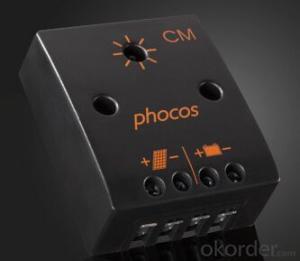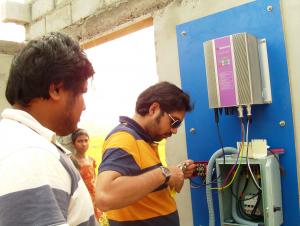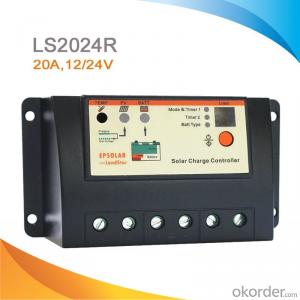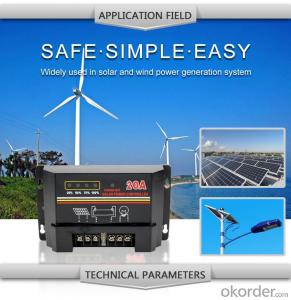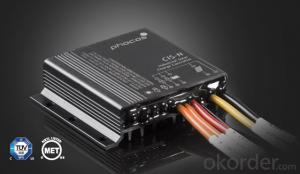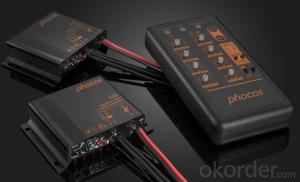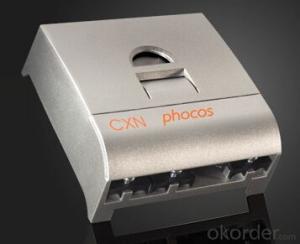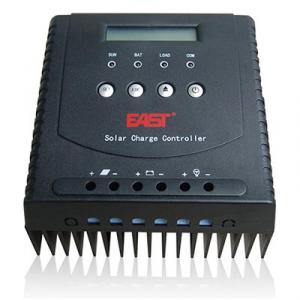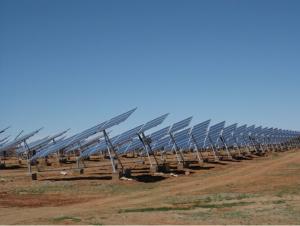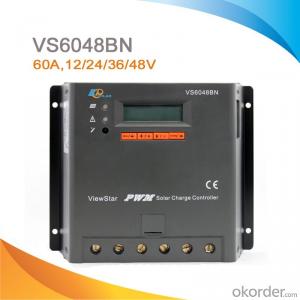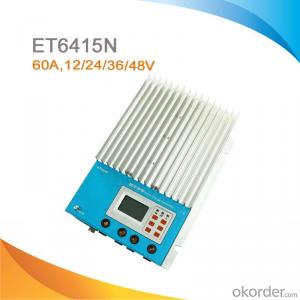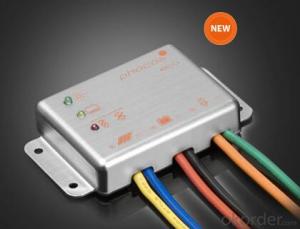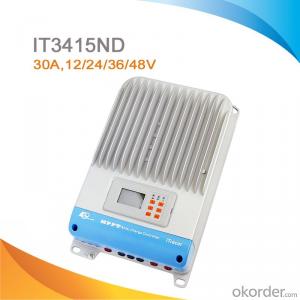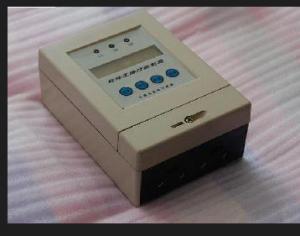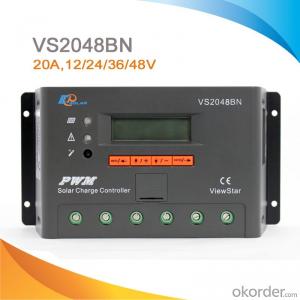Projecta Solar Controllers CM Series (4 – 10 A) Solar Charge Controllers
- Loading Port:
- China Main Port
- Payment Terms:
- TT OR LC
- Min Order Qty:
- -
- Supply Capability:
- 10000 unit/month
OKorder Service Pledge
Quality Product, Order Online Tracking, Timely Delivery
OKorder Financial Service
Credit Rating, Credit Services, Credit Purchasing
You Might Also Like
· Charging display with LED
· Large terminals (up to 16mm2)
· PWM-regulation
· Boost & float charging method
· Solid-state overvoltage protection
· Reverse polarity protection
· The CM charge controller is especially for use in small solar systems where no load disconnect is required, as in yachts, caravans, etc.
· The charging regime provides best battery treatment at reasonable cost. The electronic circuit is equipped with a microcontroller that provides high-efficiency charging technology.
- Q: Are there any safety precautions I should take when using a solar controller?
- Yes, there are a few safety precautions to take when using a solar controller. 1. Familiarize yourself with the product's user manual and instructions before installation or operation. This will help you understand the specific safety guidelines provided by the manufacturer. 2. Ensure that the solar controller is properly installed and connected according to the instructions provided. This includes the correct wiring and grounding procedures. 3. Avoid contact with any live electrical components while installing, operating, or maintaining the solar controller. Always turn off the power source and wear appropriate protective gear, such as insulated gloves, when necessary. 4. Regularly inspect the solar controller for any signs of damage, wear, or loose connections. If any issues are detected, promptly disconnect the power source and consult a professional for repairs or replacements. 5. Do not expose the solar controller to extreme temperatures, moisture, or direct sunlight, as it can affect its performance and durability. Install it in a well-ventilated and protected area, if possible. 6. In case of any abnormal behavior, such as unusual noises, smoke, or sparks, immediately disconnect the power source and contact a qualified technician for assistance. Remember, while solar controllers are generally safe to use, it is essential to prioritize safety precautions to minimize potential risks and ensure the optimal performance of your system.
- Q: Can a solar controller be used with a solar-powered non-profit organization?
- Yes, a solar controller can definitely be used with a solar-powered non-profit organization. A solar controller is an essential component of any solar power system as it regulates the charging and discharging of batteries, ensuring efficient and safe operation. By using a solar controller, the non-profit organization can effectively manage the flow of energy from solar panels to batteries, maximizing the utilization of solar power and extending the lifespan of the batteries. This will ultimately help the organization reduce its reliance on grid electricity and contribute to its sustainability goals.
- Q: How do I prevent deep discharge of batteries with a solar controller?
- To prevent deep discharge of batteries with a solar controller, there are a few key steps you can follow: 1. Choose an appropriate solar controller: Make sure you select a solar controller that offers a deep discharge protection feature. This feature will help monitor the battery voltage and prevent it from dropping below a certain threshold, ensuring it doesn't get discharged too deeply. 2. Set the low voltage disconnect (LVD) level: Most solar controllers allow you to set the LVD level, which determines the point at which the controller will disconnect the load to prevent further battery discharge. Set the LVD level to a safe value that ensures the battery doesn't get discharged below its recommended minimum voltage. 3. Monitor battery voltage regularly: Keep an eye on the battery voltage using a battery monitor or a voltage meter. This will help you gauge the state of charge and ensure it doesn't drop too low. If you notice the voltage nearing the LVD level, take appropriate action to recharge the battery. 4. Implement battery protection measures: If you have a large solar system or plan to be away for an extended period, consider adding additional battery protection measures. These can include devices like a battery protector or a low voltage disconnect switch, which will automatically disconnect the battery from the system when it reaches a certain voltage threshold. 5. Properly size your solar system: Ensure that your solar panel array is sized appropriately for your battery bank. A properly sized system will generate enough power to keep your batteries charged and prevent deep discharge. It's important to consider factors like daily energy consumption, weather conditions, and battery capacity when sizing your solar system. By following these steps and regularly monitoring your battery voltage, you can effectively prevent deep discharge of batteries with a solar controller. This will help prolong the lifespan of your batteries and ensure optimal performance of your solar system.
- Q: What is the role of a remote monitoring system in a solar controller?
- The role of a remote monitoring system in a solar controller is to collect and analyze data from the controller, panels, and other components of the solar system. It allows for real-time monitoring of the system's performance and provides important information on energy production, battery status, and any potential issues or malfunctions. This enables remote troubleshooting, efficient maintenance, and optimization of the solar system's efficiency and overall performance.
- Q: Are solar controllers necessary for small solar panel systems?
- Yes, solar controllers are necessary for small solar panel systems. They regulate the flow of electricity from the solar panels to the battery, preventing overcharging and damage to the battery. Additionally, solar controllers help optimize the efficiency and performance of the solar panel system, ensuring maximum power generation.
- Q: Can a solar controller be used in an industrial solar system?
- Yes, a solar controller can be used in an industrial solar system. A solar controller helps regulate and optimize the charging of the batteries in a solar system, ensuring maximum efficiency and lifespan of the batteries. It also helps protect the system from overcharging and over-discharging. Therefore, it is essential to have a solar controller in an industrial solar system to enhance its performance and overall functionality.
- Q: Can a solar controller be used with a solar-powered electric fence energizer?
- Yes, a solar controller can be used with a solar-powered electric fence energizer. A solar controller helps regulate and control the flow of energy from the solar panels to the energizer, ensuring optimal charging and performance of the electric fence system.
- Q: How do I integrate a solar controller with an existing solar panel system?
- To integrate a solar controller with an existing solar panel system, you will need to follow a few steps: 1. Determine the compatibility: Firstly, ensure that the solar controller you have is compatible with your existing solar panel system. Check the specifications and requirements of both the solar controller and the solar panels to ensure they can work together. 2. Disconnect the existing connections: Before connecting the solar controller, you need to disconnect the existing connections from the solar panels. This involves turning off the solar panel system and disconnecting any wires or cables attached to the panels. 3. Install the solar controller: Once the existing connections are disconnected, you can proceed to install the solar controller. The installation process may vary depending on the specific model, so refer to the manufacturer's instructions for guidance. Generally, you will need to mount the solar controller in a suitable location near the solar panels and connect the appropriate wires. 4. Connect the solar panels to the controller: After installing the solar controller, reconnect the solar panels to it. This typically involves connecting the positive and negative wires from the solar panels to the corresponding terminals on the solar controller. Ensure that the connections are secure and properly tightened. 5. Reconnect the system: Once the solar panels are connected to the solar controller, you can now reconnect the rest of the system. This includes connecting the wires or cables that were previously disconnected. 6. Test and monitor: After completing the integration, turn on the solar panel system and monitor the performance. Check if the solar controller is functioning properly and regulating the charge from the solar panels effectively. Make any necessary adjustments or settings according to the manufacturer's instructions. It is important to note that if you are unsure or uncomfortable with any of the steps involved, it is recommended to seek professional assistance from a qualified electrician or solar technician. They can help ensure a safe and proper integration of the solar controller with your existing solar panel system.
- Q: Are all solar controllers compatible with all types of batteries?
- Not all types of batteries are compatible with all solar controllers. Solar controllers have the purpose of regulating the charging and discharging of batteries in a solar power system. Different batteries have varying voltage and charging requirements, which means that solar controllers must be matched with the specific battery being used. Solar power systems commonly use lead-acid, lithium-ion, and gel batteries. Each of these batteries has its own charging and discharging voltage range, as well as requirements for temperature compensation and equalization. Therefore, solar controllers need to be specifically designed to cater to these different types of batteries. For instance, a solar controller designed for lead-acid batteries may have different charging algorithms and voltage settings compared to one designed for lithium-ion batteries. Using an incompatible solar controller with a battery can result in inefficient charging, reduced battery lifespan, and potentially damaging the battery. To ensure compatibility, it is crucial to carefully review the specifications and recommendations provided by the solar controller manufacturer. These specifications typically outline the compatible battery types, voltage ranges, and other important details. If there are any doubts about compatibility between a solar controller and a specific battery, it is advisable to consult with a professional or contact the manufacturer for guidance.
- Q: Can a solar controller be used with both 12V and 24V batteries?
- Yes, a solar controller can be used with both 12V and 24V batteries. Most modern solar controllers are designed to be compatible with various battery voltage systems, allowing users to connect both 12V and 24V batteries to the controller without any issues. However, it is important to ensure that the controller is capable of handling the higher voltage if using a 24V battery system.
Send your message to us
Projecta Solar Controllers CM Series (4 – 10 A) Solar Charge Controllers
- Loading Port:
- China Main Port
- Payment Terms:
- TT OR LC
- Min Order Qty:
- -
- Supply Capability:
- 10000 unit/month
OKorder Service Pledge
Quality Product, Order Online Tracking, Timely Delivery
OKorder Financial Service
Credit Rating, Credit Services, Credit Purchasing
Similar products
Hot products
Hot Searches
Related keywords
